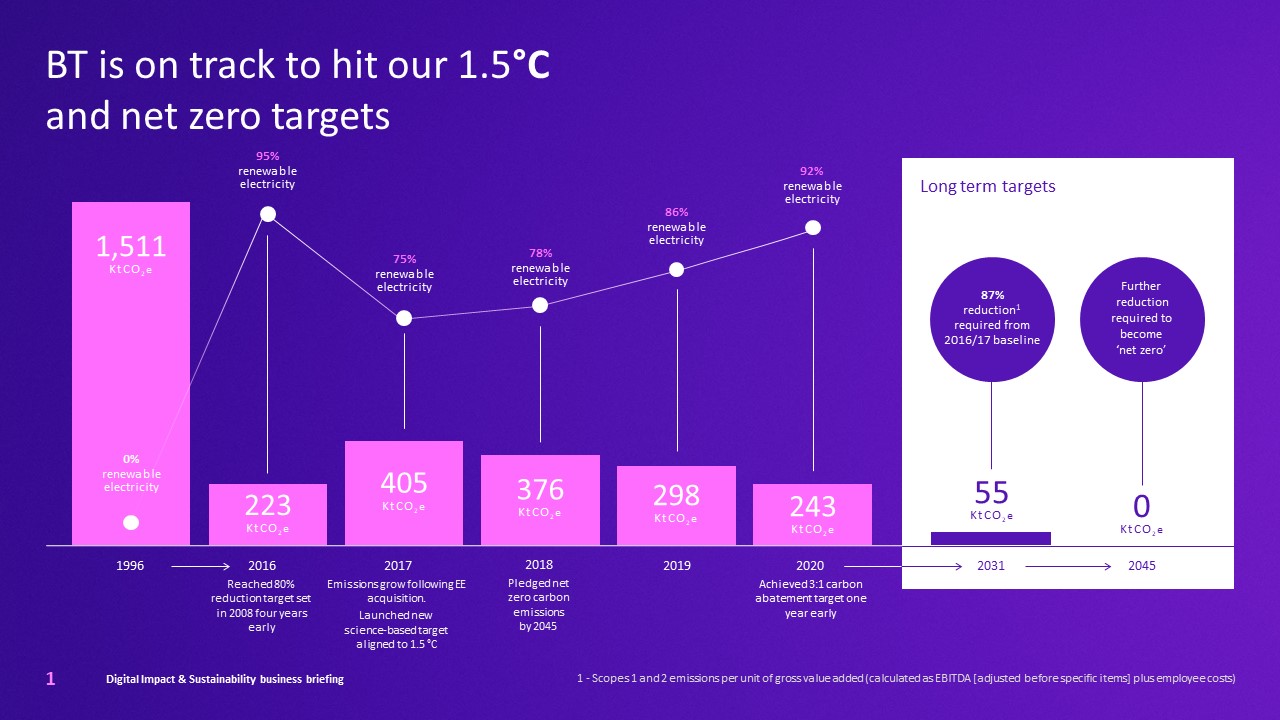March 2021 - Penelope Guarnay: Carbon Programme Manager, BT
BT Journey to Net Zero?
You’ve probably heard the term ‘Net Zero’, its presence in the media is growing, but what does it actually mean? ‘Net zero’ refers to achieving a balance between the amount of greenhouse gas emissions produced and the amount removed from the atmosphere.
At BT we have pledged to become a net zero emissions business by 2045, but our climate change journey didn’t start recently, we have actually been leading on it for over 28 years. We were one of the first companies in the world to commit to a 1.5C science based pathway – cutting emissions to help limit a rise in global temperatures to 1.5°C. To achieve this, we’ve outlined plans to reduce our carbon emissions intensity by 87 per cent by end of March 2031.
At the same time, we’re working with our suppliers to help them reduce their carbon emissions by 42 per cent in the same timeframe and now progress on carbon reduction and on digital skills training forms part of our bonus calculation for eligible BT colleagues.
As an organisation that consumes almost 1% of the UK’s electricity, BT first took steps back in 2000 by procuring renewable electricity for its UK operations. In 2015, BT Group joined RE100 to advocate with other organisations for a global transition to renewable energy and in November 2020, we were proud to announce that we’d switched to 100% renewable electricity worldwide.
While challenges remain in sourcing renewable electricity in some countries, collaboration with members of the RE100 initiative is helping to make improvements in supplies.
As well as using renewable electricity, our energy efficiency programmes have helped us to save £343m over the last decade, allowing us to re-invest those savings into adiabatic cooling, lighting, energy controls and the replacement of legacy equipment.
But our efforts alone aren’t enough. We’re calling on other businesses to set their own net zero targets for 2050 at the latest and to engage with their supply chains to do the same. Holding themselves and others to account.
As a business with 34,000 vehicles on UK roads, we’ve outlined plans to electrify up to 28,000 vehicles by 2030. With ~65% of our direct emissions coming from our fleet, it’s crucial we take action.
In 2020, we teamed up with The Climate Group and 28 other organisations to form the UK Electric Fleets Coalition. Together, we’ve successfully campaigned for an end to petrol and diesel vehicles sales by 2030 and we’re calling on the UK Government to go further.
We need further policies to underpin this transition date, such as Zero Emission Vehicle mandates to stimulate supply, encourage greater investment in Electric Vehicle (EV) charging infrastructure, in particular supporting affordable public charging infrastructure, to ensure that those who do not access to off-street parking, are not at a price disadvantage to those who can. Similarly, we are calling for an extension to the EV vehicle and charging grants, beyond 2023 until price parity is reached to ensure the rapid early adoption of EVs.
Great connectivity is also vital to the UK. We’ve announced a once-in-a-generation investment in the UK’s digital infrastructure: full fibre broadband to 20 million premises by the med to late 2020’s and continued investment in 5G mobile. These investments will enable innovative solutions which have the ability to abate carbon and drive the huge changes needed to achieve a net zero carbon economy.
Our networks support everything from home-working through to the development of smart cities, the Internet of Things and we are helping to uncover the latest green technologies to help our public sector customers through our Green Tech Innovation Platform .
In 2019 the Centre for Economics & Business Research found that connecting the UK to full fibre broadband by 2025 would deliver a £60 billion boost to the UK and could save up to 300 million commuting trips annually.
Later this year at the COP26 climate conference in Glasgow, the UK has an opportunity to lead on climate action. The event should be used to inspire hope, optimism and to advocate for renewable electricity generation, a faster transition to zero emission vehicles and for greater collaboration.
2021 has to be the year when we act. We want to see greater investment in infrastructure, support for UK manufacturing and a focus on green technologies - helping to create decent jobs and sustainable growth. We believe we’ve got a big role to play and we hope others will follow.
Penelope Guarnay: Carbon Programme Manager, BT
Penelope has worked in Energy and Sustainability for over 15 years, she is responsible for leading BT's decarbonisation programme, working with colleagues on renewable energy, electric vehicles, low carbon buildings and advocating for policies which will help to transition the UK to a Net Zero economy. Penelope was also a founding board member of the Energy Managers Association (EMA).


